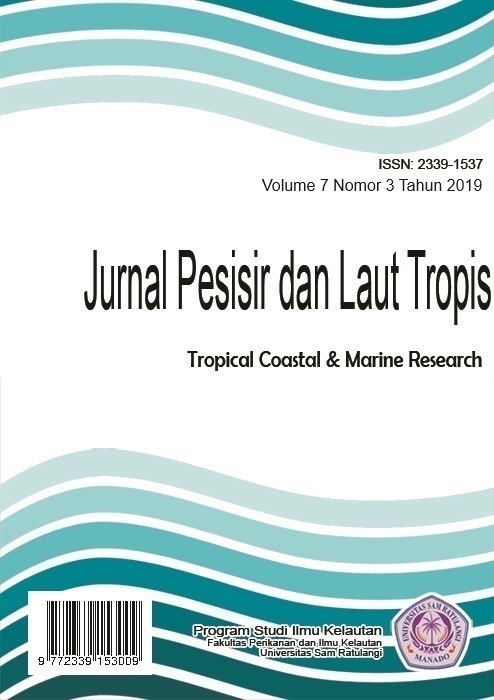Monitoring pertumbuhan mangrove di area modulasi karang dan mangrove Kampus Tateli Politeknik Negeri Manado
DOI:
https://doi.org/10.35800/jplt.7.3.2019.26447Abstract
Research conducted in the Coral and Mangrove Modulation Area of the Tateli Campus of the Polytechnic of Manado State, in January to October 2019 aims to identify and differentiate the types of mangroves and then obtain data on mangrove growth in the Coral & Mangrove Modulation Area of the Tateli Campus. Retrieval of data using an area of 20 m2 of mangrove modulation and divided into four quadrants measuring 10 m2, while the tools used are: a compass to determine the direction or azimuth of research, a meter to measure distances., A photo camera for documentation tools, computers and other stationery which is used for data processing and writing research, rope, Tally sheet., Height measuring devices. Observations and data collection in this study included the measurement of trees, saplings, seedling height, seedling leaves, and seedling branches. From the existing mangrove modulation, four quadrants of mangrove observation were obtained. There are a number of mangrove individuals whose growth is observed and seen from the height, number of leaves and branches of the mangrove. Based on observations, it was found that in quadrant one there were two types of mangroves in the seedling phase, namely Rhizophora Apiculata and Rhizophora Mucronata with a total of 17 individuals. The average leaves of R. Apiculata are 7 strands. Then in the second quadrant two mangrove species were found, namely R. Apiculata and Sonneratia Alba, with a total of 15 individuals where the average height of Rhizophora Apiculata seedlings was 78cm, while Sonneratia Alba was 25.71cm. Furthermore, in this third quadrant only one species of mangrove Sonneratia Alba was found in the seedling phase. In this quadrant there are 15 mangrove individuals, with an average height value of 28.33 cm, an average value of leaves of 7.8 strands, an average value of 0.27 branches and the last in the fourth quadrant there are four types of mangrove seedlings namely R. Apiculata, R. mucronata, Brugueira Gymnoriza, and Sonneratia Alba. In this quadrant, 30 individual mangrove seedlings were found. Based on these results it can be concluded that from the existing mangrove modulation, obtained four quadrants of mangrove observation. There are several mangrove individuals whose growth is observed, as seen from the height, number of leaves and branches of the mangrove. Then the average mangrove growth is dominated by R. mucronata species. Whereas the highest rate of mangrove growth for 10 months is Brugueira Sp.
 Keywords: Mangroves, Growth















